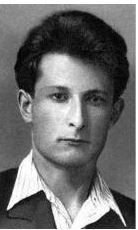The pre-eminent Soviet composer Dmitri Shostakovich said that it was his student (and later friend) Veniamin Fleishman who had introduced him to the world of Jewish folk music. Thus, it can be said that Shostakovich's well-known vocal cycle From Jewish Folk Poetry (op. 79, composed in 1948, first performance in 1953, after Stalin's death), as well as numerous quotations from Jewish folk music in the maestro's postwar body of chamber music and in his First Violin Concerto (op. 77, composed in 1948), owe their existence to Veniamin Fleishman.
Veniamin Fleishman was born in 1913 in Bezhetsk, 240 kilometers (150 miles) north of Moscow, to the dentist Iosif Fleishman and the teacher Rakhil Fleishman. Veniamin's parents had moved to the safer, albeit more provincial, town of Bezhetsk from their native Vilna in 1911, after Rakhil had served a prison term for her revolutionary activities. They raised five children. Three of their sons, as well as a son-in-law, would die in the Soviet-German war of 1941-45.
Veniamin grew up in a musical atmosphere, and, according to his mother, as a baby he had begun to sing before he could speak. He played the piano and the violin. The parents wanted him to study engineering, and, because of this, Veniamin's early biography was so tortuous. However, in 1937 he managed to enroll in the Leningrad (St. Petersburg) Conservatory, becoming a student of Dmitri Shostakovich. They became friends, and Veniamin named his firstborn son Dmitri, after his teacher. Upon finishing his first year of study, Veniamin Fleishman wrote his first work – a cycle of romances based on poetic texts by Goethe and Mikhail Lermontov.
Following the outbreak of the Soviet-German war, Veniamin tried to enlist in the Red Army, despite having an exemption from military service. Because of his lack of systematic military training, he was assigned to the Leningrad People's Militia (opolcheniie). Shostakovich later wrote about him:
"He [Fleishman] went into the People's Volunteer Guard (opolcheniie). They were all candidates for corpsehood. They were barely trained and poorly armed, and thrown into the most dangerous areas. A soldier could still entertain hopes of survival, but a volunteer guardsman, no. The guard of the Kuibyshev District, which was the one Fleishman joined, perished almost completely".
Translated from Russian, from "Orelfoundation" Website
In September (most likely on September 14) 1941, Veniamin Fleishman was killed during the defense of the Leningrad suburb Krasnoie Selo. According to an eyewitness account, he died in a pillbox that was blown up by the enemy.
In the late 1930s, Veniamin conceived his main oeuvre – the one-act opera Rothschild's Violin, based on Chekhov's eponymous short story. Prior to the war, he was able to finish the piano reduction, and began work on the orchestration. Captain Boris Kliuzner, who also took part in the defense of Leningrad, managed to retrieve Fleishman's papers out of the besieged city and bring them to Shostakovich. Having learned of Fleishman's death, Shostakovich finished the orchestration himself. The opera was performed for the first time in Moscow in 1960, at Shostakovich's intiative. In 1968, it was staged by the Leningrad Experimental Studio for Chamber Opera of the Leningrad Conservatory. Immediately, the Party authorities branded the opera as "Zionist" and banned it from further performance.
Veniamin's brother, Isai Fleishman, was killed on the Leningrad front in the autumn of 1941. The youngest brother, Sergeant Ilia Fleishman, died during the defense of Voronezh, southern Russia, in August 1942.
The Soviet composer Ian Frenkel dedicated an article to the memory of Veniamin Fleishman:
The article ends with the following words:
"Veniamin Fleishman has fallen. But his death, like the deaths of millions of other victims of the fascist invasion and fascist atrocities, will be avenged.
Forty years ago, a titan of Jewish poetry [a veiled reference to Hayim Nahman Bialik], stunned by the horrors of the Kishinev pogrom, …composed verses imbued with wrath and pain, excoriating his brethren for their weakness, passivity, and inability to resist.
Much has changed since then.
Today, the Jews of the Soviet Union, together with all the peoples of the country, are fighters of the great Red Army, which has not only successfully resisted the modern murderers and instigators of all-Jewish pogroms, but is now going to bring swift and merciless retribution upon their heads.
The butcher's bill will be presented; it will be paid in full. Measure for measure.
This bill will also list the name of Veniamin Fleishman, an unrealized hope of his motherland and his people".







